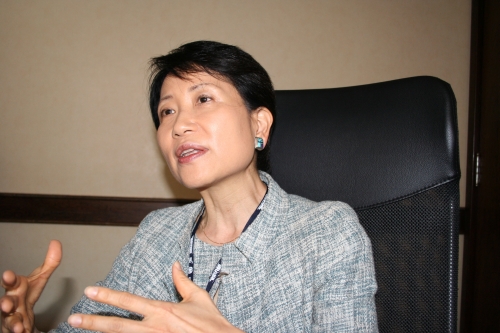To help developing countries monitor and report progress in a transparent manner under the Paris Climate Agreement, a new financial initiative and an associated trust fund was approved on Tuesday in Washington, DC by the Global Environment Facility (GEF) Council.

Set up in response to a Paris Agreement decision, the Capacity Building Initiative for Transparency (CBIT) trust fund will help countries in their efforts to build institutional and technical capacity for meeting enhanced transparency of action and support needs.
Many developing countries still lack the necessary capacity to effectively monitor and report their progress vis-à-vis national greenhouse gas emission reduction, and track progress made in the implementation of their Nationally Determined Contributions, or NDCs.
“The Paris Climate Agreement represented a watershed moment for the global commons,” said Naoko Ishii, GEF CEO and Chairperson. “One key success factor to the Agreement is its bottom-up approach, building on countries’ INDCs. Transparency of reporting is the linchpin to the credibility of, and mutual confidence in, the agreement.”
Addressing the 50th GEF Council meeting in the US capital, Ishii said, “I am honoured that countries have put their trust in the GEF to take on this important task. We are fully committed to support the CBIT, which I believe is key to ensure the success of the Paris Agreement. I also want to express my appreciation to donor countries, who are considering to make voluntary contributions, and to the recipient countries, who are committed to start implementing the CBIT.”
A number of donor countries have expressed their support for the new fund, including pledges of US $15 million from the United States, £10 million from the United Kingdom, and CAD $5 million from Canada. Others, including Germany, Italy and New Zealand have also confirmed their intention to announce pledges of support in the near future. The World Bank has been invited to serve as the Trustee for the CBIT Trust Fund.
“Transparency is a bedrock of the Paris Agreement. The United States recognises that an enhanced transparency system will require greater efforts from all countries,” said U.S. Special Envoy for Climate Change Jonathan Pershing. “Our $15 million pledge is an indication of our strong commitment to building developing countries’ institutional and technical capacity to meet these enhanced transparency requirements.”
COP21 in Paris last December requested the GEF to support the establishment and operation of the CBIT as a priority reporting-related need, including through voluntary donor contributions. The aims of the CBIT are to strengthen national institutions for transparency-related activities in line with national priorities, to provide relevant tools, training and assistance for meeting the provisions stipulated in Article 13 of the Paris Agreement, and to assist in the improvement of transparency over time.
At COP21, the GEF was reconfirmed as the financing mechanism for the climate convention. Parties also requested the GEF to consider how to support developing country Parties in formulating policies, strategies, and programs and projects to implement activities that advance priorities identified in their respective climate action plans, or INDCs, in a manner consistent with the operational policies and guidelines of the GEF, starting in 2016. To respond to this guidance, the GEF is now encouraging governments to align the GEF programming for GEF-6 with INDC priorities, i.e., asking for more explicit linkage between INDCs and how GEF resources are programmed.
The 50th session of the GEF Council opened with strong endorsement by many member governments for the strategic direction the organisation is heading.
In her opening remarks to the Council, Ishii, said, “The worsening global environment is an ever increasing threat to our global aspirations for growth, jobs, security and prosperity. In many ways, the GEF’s support for Earth’s life support systems is needed more than ever.”
Referring to the opportunities presented by the adoption of the Sustainable Development Goals and the Paris Climate Agreement, she said, “We need to build on the momentum created by the SDGs and Paris and strengthen this emerging global movement for safeguarding the global environmental commons. It’s the wisest investment we can make.”
“I am convinced that only when everybody plays their part, can we achieve the massive transformation in our economies that we need to safeguard the global commons,” she added.
The GEF Council meeting is also marking the 25th anniversary of the GEF being at the forefront of tackling the planet’s most pressing environmental problems. In its 25-year history, the GEF has invested some $14.5 billion – and leveraged an additional $75.4 billion – for nearly 4,000 projects in 167 countries.
